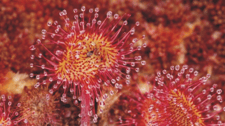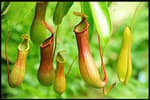Mode of Nutrition in Plants
Mode of Nutrition in Plants: Overview
This topic covers concepts such as Symbiotic Relationship in Plants, Heterotrophic Mode of Nutrition in Plants, Saprotrophic Nutrition in Plants, Insectivorous Plants and Parasitic Adaptations in Cuscuta.
Important Questions on Mode of Nutrition in Plants
Which of the following bacteria in leguminous plants help in the absorption of nitrogen?
Which of the following is a saprotroph?
Discuss heterotrophic nutrition in plants
Insectivorous plants eat insects because they _____
Write short notes on saprophytic plants.
In pitcher plant, a pitcher is the modified form of a _____.
Which of the following is not an insectivorous plant?
It is a saprotrophic plant-
Most _____ plants make their own digestive enzymes. (carnivorous/aquatic)
Insectivorous plants trap _____ to meet their nutritional needs.
Identify and name this plant. Choose from the options given below:
(Sundew, Water hyacinth, Banyan tree, Saguaro, Cactus, Deodar, Weathered tree, Pitcher plant)

Identify and name the plant by choosing from the help box.
| Sundew, Water hyacinth, Banyan tree, Saguaro cactus, Deodar, Weathered tree, Pitcher plant |

Plant eating insects are called _____ .
Fill in the blank with the correct option provided in the bracket.
Insectivorous plants feed on insects to get _____(nitrogen/phosphorus/hydrogen) based compounds.
Name the following. The first word begins with the letter I and the second with P.
Plants that eat insects:
Can you make out what type of plant this is? The word begins with the letter I.
When an insect lands on my leaf, I catch it and eat it.
Give one example of symbiotic nutrition in our daily life. (Bacteria/Lichens)
